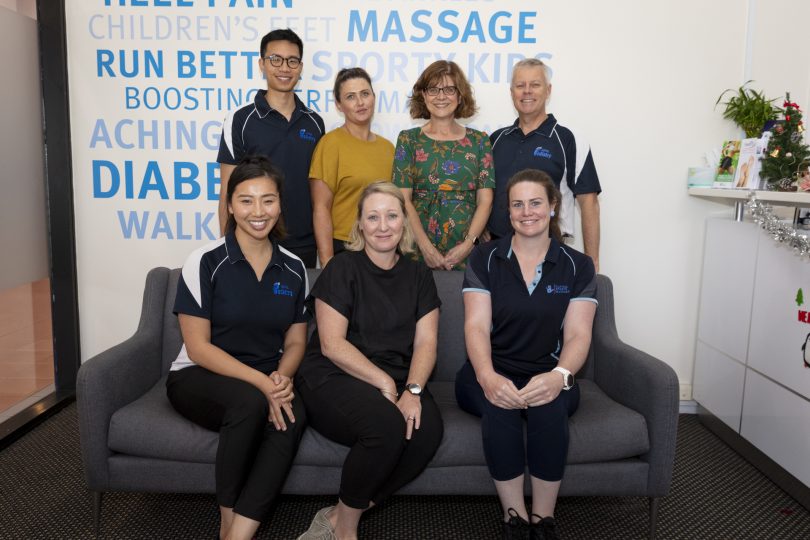
Mark and Liz Hoyland (back row, right) with the Capital Podiatry team. Photo: Thomas Lucroft.
Podiatry, and podiatrists, are the health professionals you turn towards to treat anything to do with your feet, ankles, and lower legs. Podiatrists are trained in the treatment of ingrown toenails, pain caused by growth spurts and high impact sporting activity, diabetic feet, sports injuries, wound care and all kinds of conditions related to our feet, gait and posture.
A visit to a podiatrist can relieve the pain of repetitive sporting activity such as running or jogging, or from wearing those six-inch heels during the silly season and spending hours on your feet shopping or working.
“It can be arthritis, rheumatoid arthritis, stuck joints, inflamed tendons or ligaments, dysfunctional muscles, nerve pain – there’s no end,” says Capital Podiatry’s Mark Hoyland, who has been practicing podiatry for 20 years.
“I have a real interest in function, in things such as gait analysis.
“We have a gait analysis system in one of our rooms. It films people while they’re walking or running, and shows pressures under the feet. You can look at different angles and how things move and then tie that into the problems they’re having and find ways to address it so it’s a much more holistic approach.”
Mark uses leading-edge technology to see what happens when you walk, run or jog to see where the load is being taken by your feet, and address any potential problems to ensure your best sporting performance and to determine how your posture, gait, and the rhythm of your gait affect the musculoskeletal mechanisms of your lower limbs.
All the podiatrists at Capital Podiatry treat sports-related injuries or pain, and many of the people they treat are weekend warriors returning to community sport following the COVID-19 lockdown.
“Going into spring is always extreme,” says Mark. “People are charging out and getting the fitness bug.”
However, with the wrong gait, shoe or posture, the impact of playing sport for fitness can be a painful one. There are several ways podiatrists treat patients with pain in their lower limbs, including massage, trigger point work, dry needling and releasing stuck joints.
“It can be a postural knock-on effect,” says Mark. “If there’s something going on in the body that’s not right, the body always tries to compensate and it can only do that for so long before the structures that are compensating give up.
“Repetition is always the enemy. If someone’s doing a lot of one thing on their feet for a long time, the body isn’t built for repetition.”
The Capital Podiatry practice is at Tuggeranong, and Liz Hoyland is one of the business’ owners.
“We live and breathe our culture,” she says. “We’re all about lifelong learning, and we hire people who are as committed as we are to those great values such as kindness, creating a happy workplace, and team first.
“We’re really big on staff development. We have a structured mentorship program for our podiatrists, and we make sure we’re all updating our skills all the time.”
Mark says a client’s consult starts the moment they walk in the front door.
“We try to make it a great experience right from the start when our reception team says hello,” he says.
“It’s about how comprehensive our treatment is. We’re always trying to be on the cutting-edge, whether it’s a new technique or a new piece of technology, we’re always pushing the envelope. We want it to be a pleasant experience for people, and we do our best to help people.”
No referral is needed to make an appointment at Capital Podiatry, but if you have a chronic condition such as diabetes, the team can organise a rebate from Medicare for you with a general practitioner’s referral.
If you would like further information on how Capital Podiatry can help you, head to its website to make a booking online, or call on 02 6293 3300.
Original Article published by Sharon Kelley on The RiotACT.
This is a sponsored article, though all opinions are the author’s own. For more information on paid content, see our sponsored content policy.


What's Your Opinion?